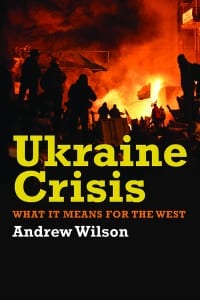“This is clearly not just about Ukraine, but about Russia’s ambitions in the whole neighbourhood”
By Sean L Hanley, on 20 October 2014
 Andrew Wilson discusses his new book Ukraine Crisis: What it Means for The West with SSEES Research Blog.
Andrew Wilson discusses his new book Ukraine Crisis: What it Means for The West with SSEES Research Blog.
SRB: You made a trip to Ukraine when writing this book. Could you tell us about your experiences there?
AW: When I was there, it struck me as a good idea that there was a book in all this. The previous time I was in Ukraine was in November last year, just before the protests started. But by February, it was also pretty clear that things were getting exciting and heading to some kind of denouement. So what do you do? You just go.
I arrived in the middle of an old fashioned revolution. I remember a human chain collecting cobblestones. At the front you had young guys chucking them at the militia, but the human chain was made up of the entire citizenry of Kiev – well dressed women in high heels coming from the office, the grandmother at the front still holding her shopping in a blue plastic bag. It was like a nineteenth century revolution between the citizens and the evil rulers, a bit like Les Miserables.
The book went to press really quickly, but hopefully, I can put some pictures in the second edition.
SRB: You refer to the Orange Revolution as a precedent to the Ukraine crisis. To what extent do you see this crisis is a continuation of the 2004 Orange Revolution?
AW: Well, the protesters clearly had that in mind. Initially they were copying the tactics of the Orange Revolution and it started in the same way – a peaceful, carnival-like protest. But people were also thinking of how to do it better. It was clear very early on during the Orange Revolution in 2004 that the regime wasn’t capable of using violence, whereas this time the regime did use violence–but did so very early and not sufficiently to put an end to things. So had a very early set of calculations with how to deal with a very different regime.
Ultimately the tragedy is that immediately after the uprising there was a sense of optimism that Ukraine was doing better this time but it never got the chance to show that because people were still learning lessons from the disappointments that followed the Orange Revolution.
SRB: Do you think in the immediate future that the Russia’s hegemony will dictate the political paths of countries in Eastern Europe?
AW: We can see Russia trying to influence all its neighbours, not just Ukraine. The bigger picture is a pretty scary one. If it is true that the countries that reformed fairly successfully in the 1990s in Central Europe were able to do so only because Russia was not really able prevent them, whereas Russia is now so able to do so here –that’s a pretty depressing conclusion.
It’s not just Ukraine but other countries that might be unable to reform or undertake the EU-friendly policies that Brussels wants; Moldova is a big test case with the election coming up, Georgia is a very interesting case too, because it has already reformed but under Russian pressure is now backsliding a bit. We can also see the reintroduction of a more Russian political culture – back to corruption, patronage, political prosecutions. The Baltic States are an important test case too because they’re in EU and NATO, but will that protect them from Russian pressure?
What’s more, this is clearly not just about Ukraine but about Russia’s ambitions in the whole neighbourhood. Long- term I think Russia is over extended, so it would be able make trouble everywhere, but it can probably make trouble in two countries at once. (more…)
 Close
Close






